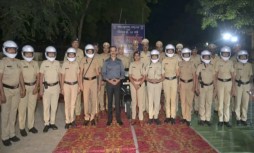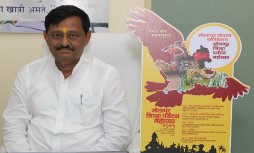Vidarbha’s Heart Under Stress — Middle Age and Young Patients at Risk, Finds Wockhardt Survey
September 25,2025
* Preventive culture absent as most patients arrive late, risking survival chances
Nagpur : As responsible corporate, Wockhardt Hospitals, Nagpur, conducted a month-long Heart Health Insights Survey with practicing doctors across Nagpur and nearby areas. The target group included cardiologists, general practitioners, and resident medical officers (RMOs), offering a comprehensive picture of cardiac health challenges in central India.
The survey findings have raised serious concerns: heart disease is no longer confined to older age groups. Most doctors said middle-aged patients (41–60 years) dominate the cases, while many noted that young adults in their 30s are increasingly presenting with cardiac conditions.
“Ten years ago, seeing cardiac patients in their 30s was rare in Nagpur. Today, stressful jobs, poor lifestyle choices, and lack of timely screening are bringing younger patients to hospitals with heart attacks. This is a wake-up call,” said Dr. Nitin Tiwari Senior Cardiologist, Wockhardt Hospitals, Nagpur.
The survey revealed that preventive heart check-ups are still neglected. A large number of doctors said patients approach them only after symptoms, rather than coming for preventive screenings.
“In today’s competitive environment—both at the workplace and at home—youngsters are under immense pressure, which often leads to poor sleep quality and, in turn, increases the risk of cardiac arrest,” said Dr. Sumit Narang, Senior CVTS Surgeon at Wockhardt Hospitals, Nagpur.
“Urbanization, Sedentary Jobs, Abdominal obesity, Diet Transition, Increasing air pollution, Stress, Lack of quality sleep, early onset diabetes, genetic predisposition cause a deadly cocktail in patients from Indian Subcontinent for early onset of heart disease” said Dr. Dinesh Padole, Cardiologist at Wockhardt Hospitals, Nagpur.
“Preventive culture is still missing. By the time patients arrive, we often lose the golden hour that could save lives. Awareness and timely screening are the need of the hour,” said Dr. Amit Ballamwar Interventional Cardiologist, Wockhardt Hospitals, Nagpur.
Another alarming finding: awareness is low. Over two-thirds of doctors said patients are only partially aware of their BP, cholesterol, and sugar levels. More than half observed that patients fail to recognize early warning signs of a heart attack, such as chest pain, sweating, or breathlessness.
“This survey reflects the reality we face in Nagpur every day. Awareness, speed, and access are three critical factors. At Wockhardt, we consider it our responsibility to bridge these gaps by engaging with doctors, communities, and media to build a healthier Vidarbha,” said Ravi Bagali Center Head, Wockhardt Hospitals, Nagpur.
Overall, the survey covered Western India — Mumbai City, MMR, Rajkot, and Nagpur — with participation from around 326 doctors. Out of this, 48 doctors from Nagpur contributed their responses, forming the basis of this report.
About Wockhardt Hospitals Ltd.:
Wockhardt Hospitals Ltd. is a chain of tertiary care super-specialty hospitals with facilities in Nagpur, Rajkot, South Mumbai, and North Mumbai. Known for its state-of-the-art infrastructure and globally benchmarked processes, Wockhardt Hospitals prioritizes patient safety and quality of care. The guiding philosophy is to serve and enrich the Quality of Life of patients, making it one of the few professionally managed corporate hospital groups in the country.
Survey Insights (Wockhardt hospitals doctor’s Exclusive remarks)
1. What has been the gender distribution among heart patients in the past year?
• Majority (70%+) of doctors said heart issues are predominantly in men.
👉 Remark: Men remain more vulnerable, though women too are increasingly affected.
2. Which age group is most commonly affected with heart-related conditions?
• Over 80% said middle-aged (41–60 years) dominate cases.
• Some pointed to seniors (60+).
👉 Remark: Middle age is the critical risk bracket, with seniors also at risk.
3. Have heart cases among patients under 40 increased compared to 5 years ago?
• A large majority reported significant or slight increase.
👉 Remark: Doctors clearly see a growing number of younger patients.
4. What do doctors believe are the main drivers of heart disease in their region?
• Almost all said “all of the above” — stress, sedentary lifestyle, unhealthy diet, smoking, and diabetes.
👉 Remark: Heart disease in Nagpur is driven by a combination of lifestyle and metabolic factors.
5. Do patients usually come for preventive cardiac check-ups or only after symptoms?
• A large share said most patients come only after symptoms.
👉 Remark: Preventive health awareness is still very low in Nagpur.
6. How aware are patients about their BP, cholesterol, and sugar levels before diagnosis?
• Majority: Partially aware.
👉 Remark: Patients often live in “half-knowledge” zones — risky for cardiac health.
7. During cardiac emergencies, how often do patients reach the hospital within the golden hour?
• Most doctors said “sometimes” or “rarely”.
👉 Remark: Delayed arrival continues to reduce survival chances.
8. How well does the public recognize early warning signs of a heart attack?
• Most said awareness is partial, some said poor.
👉 Remark: Many patients don’t link chest pain or sweating to heart attack, which can be fatal.
9. What are the biggest barriers preventing timely treatment for heart disease?
• Many pointed to financial or access-related barriers, others to late recognition and poor emergency response.
👉 Remark: In Nagpur, both economic and awareness gaps delay treatment.
10. What preventive strategy should be prioritized to reduce heart disease in India?
• Majority: Lifestyle modification (diet, exercise, no tobacco).
• Others: Regular preventive check-ups and better facilities.
👉 Remark: Doctors stress prevention is the only sustainable solution.









